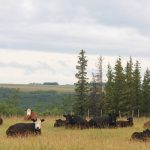EDMONTON — It’s business as usual for agriculture in the latest provincial budget, said Alberta’s agriculture minister.
“We came through relatively unscathed in any shape or form. We did very well,” said Evan Berger, after the budget was released Feb. 9.
Agriculture spending increased from $972 million to more than $1 billion in the 2012-13 budget and is expected to continue to increase slightly over the next two years.
Alberta finance minister Ron Liepert has forecast Alberta’s revenues to increase $1.8 billion to a record $40.3 billion through a combination of higher income tax revenue, strong bitumen royalties and higher federal transfers.
Read Also

Weigum’s work with Alect Seeds earns her Alberta’s Outstanding Young Farmer award
Three Hills farmer earns Alberta’s Outstanding Young Farmers award through marketing of Alect Seeds to bring the best varieties and crop types to their customers and improve the quality of the land they farm.
No tax increases have been planned for the 2012-13 provincial budget, said Liepert Feb. 9 when he delivered the provincial budget.
“There are ways of creating a bigger pie. It’s not just as simple as if you raise taxes, you will get more money. If you raise royalty rates, you will get more money. That is the discussion we want to have with Albertans because we want to have creative ways of making this happen rather than simply just increase taxes.”
The biggest jump in agricultural spending was an increase in income supports to an expected $226 million from $171 million as the province rebuilds its financial cushion in income support programs.
“There was not a lot of draw this year but with that comes an increased liability with higher prices and high yields. We’re building up a margin to address it if we have an issue.”
Budgets for Agriculture Services Boards, the agricultural division of rural municipalities, has increased $1 million to address increased costs associated with their growing role as agricultural advisors.
“They are really great at addressing local issues rather than from 400 miles away. This million will just help them meet some of their cost pressures,” said Berger.
It’s the first increase directed at these boards in more than seven years.
Bob Barss, president of the Alberta Association of Municipal Districts and Counties, is happy with the budget, especially with increases to infrastructure grants and Municipal Sustainability Initiative funding.
“The budget for rural municipalities is a pretty strong budget. Our MSI grants went up by one percent. We’re happy about that,” said Barss.
Secure MSI funding is what municipalities count on to plan for rebuilding roads, bridges and municipal projects. MSI funding is projected to increase from $876 million to $896 million to just over $1 billion in two years.
“That is going to have a huge impact on what is happening in municipalities and a huge impact in rural Alberta and we’re glad to see that has taken place,” he said.
Secure funding is especially key when many of Alberta’s bridges, built in the 1950s, are coming to the end of their life.
“It’s good to see the government has recognized that need.”
Barss is concerned about a reduction in funding for water and wastewater projects, both big issues facing rural Albertans. Despite decreases in some areas, he believes rural Albertans won’t see big cuts coming.
“There is a lot of good things in this budget for rural Alberta. Rural Alberta is going to come out pretty well.”














